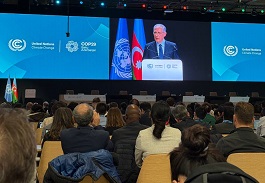BY YANET FANTAYE WOGAYEHU / BAKU, AZERBAIJAN – The 29th round of the global climate change conference Conference of Parties (COP29) is opened in Baku, Azerbaijan on Monday.
At the opening COP 28 President Sultan Al Jaber (United Arab Emirates) passed the torch to COP 29 President Mukhtar Babayev (Azerbaijan), who highlighted the key expectation for the meeting: to deliver a fair and ambitious new collective quantified goal on climate finance (NCQG).
“This will be a game-changing tool to direct resources to the developing world. Following years of stalemate, the breakthroughs in Baku have now begun. But there is much more to deliver,” said COP29 President Mukhtar Babayev.
The COP29 Presidency identified the full operationalization of Article 6 as a key negotiating priority this year. Finalizing Article 6 negotiations could reduce the cost of implementing national climate plans by $250 billion per year by enabling cooperation across borders. Today’s decision is an essential step in achieving that goal and establishes strong momentum for continued progress over the coming two weeks of negotiations.
The COP29 President opened the summit by setting clear expectations for how global leaders must enhance ambition and enable action during the conference. COP29 is a critical moment for global leaders to come together and demonstrate their collective commitment to climate action. The summit runs from 11-22 November in Baku, Azerbaijan, and approximately 70,000 delegates are registered to attend, including heads of state and government who will participate in the leaders’ segment on 12-13 November.
In his opening address Mr. Babayev highlighted how current policies put the world on track for catastrophic warming of 3 degrees Celsius, citing the latest UNEP Emissions Gap Report. “We are on a road to ruin,” he told delegates. “Whether you see them or not, people are suffering in the shadows. They are dying in the dark. And they need more than compassion, more than prayers and paperwork. They are crying out for leadership and action. COP29 is the unmissable moment that can chart a new path forward for everyone.”
UN Climate Change Executive Secretary Simon Stiell also emphasized the importance of reaching a new global climate finance goal in Baku. “If at least two thirds of the world’s nations cannot afford to cut emissions quickly, then every nation pays a brutal price,” he said. “So, let’s dispense with any idea that climate finance is charity. An ambitious new climate finance goal is entirely in the self-interest of every nation, including the largest and wealthiest.”
To enhance ambition, the COP29 President called for countries to submit 1.5-aligned Nationally Determined Contributions to reduce emissions ahead of next year’s deadline, submit National Adaptation Plans by 2025 to prepare for a warming world, and deliver their first Biennial Transparency Reports (BTR) this year.
What is Article 6 and why does it matter?
Article 6 of the Paris Agreement will provide trusted and transparent carbon markets for countries as they collaborate to reach their climate goals.
Article 6 compliant markets will be a critical tool to channel more investment to developing countries.
It will allow countries to target mitigation efforts to where the costs are lowest.
The full functioning of Article 6 will be a significant step for the implementation of Nationally Determined Contributions (NDCs) in a cost-effective manner, and in bolstering ambition in mitigation and adaptation.
IETA has shown that Article 6 can reduce the cost implementing countries’ NDCs by about $250 billion per year.
What was agreed on Monday?
Today, Parties have welcomed the standards adopted by the Article 6.4 Supervisory Body for the creation of carbon credits under Article 6.4.
These standards will ensure that the international carbon market is high integrity, and that emissions reductions and removals are real, additional, verified and measurable.
The standards for Article 6.4 agreed today are not set in stone. As they are governed by the CMA, the Parties will be able to further enhance them as they see fit.
How did we get to this breakthrough?
In October, Azerbaijan hosted a meeting of the Supervisory Body for Article 6.4.
At that meeting, the Supervisory Body proposed a set of standards for Article 6.4
The COP29 Presidency built support for these standards at pre-COP, and intensively engaged with Parties to lay the foundations for early adoption.
What are the next steps?
The Parties still need to agree on the remaining building blocks of Article 6. This includes Article 6.2 and the final elements of Article 6.4.
This will help to create confidence to boost cooperation under Article 6, making it a more effective tool in fighting climate change.
Once Article 6 negotiations have concluded, the COP29 Presidency will encourage the uptake of Article 6 carbon trading, so that countries can realize its potential benefits.

